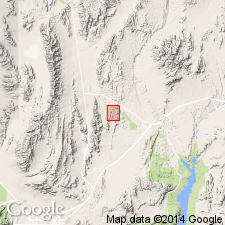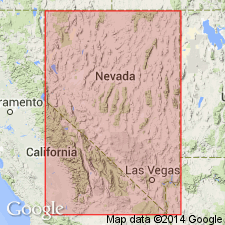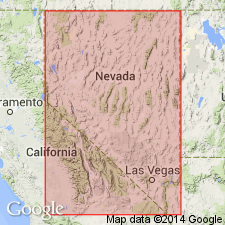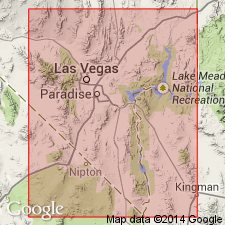
- Usage in publication:
-
- Battleship Wash Formation
- Modifications:
-
- Original reference
- Biostratigraphic dating
- Dominant lithology:
-
- Limestone
- Sandstone
- AAPG geologic province:
-
- Great Basin province
Summary:
Pg. 225-240. Battleship Wash Formation of Bird Spring Group. Is basal formation of Bird Spring Group. This unit termed "BSa" of Bird Spring Group by Langenheim and others (AAPG Bulletin, v. 46, no. 5, 1962). At type section consists of three unnamed members. Basal sandstone member is 4.5-foot interval of interbedded sandy limestone and calcareous sandstone in beds about 4 inches to 1 foot thick. At Arrow Canyon contains abundant specimens of FABEROPHYLLUM sp. Middle member about 65 feet thick at type locality. Consists of medium-grained, thick-bedded limestone characterized by strikingly parallel bedding. Rocks are spar cemented. Fossils notably absent. Uppermost member consists of about 8 feet of medium-grained limestone which weathers purplish gray and is more thinly bedded than middle member. Bedding plane surfaces bear association of STIGMARIA sp., shark teeth, solitary rugose corals and spirifer brachiopods. Total thickness about 80 feet. Overlies the Yellowpine Limestone of the Monte Cristo Group. Underlies unnamed unit "BSb" of the Bird Spring Group. Age is Late Mississippian (Chesterian).
Type section: exposures in north wall of Arrow Canyon at lower entrance to the deep and narrow upper gorge, Arrow Canyon Range, Clark Co., southeastern NV.
Source: US geologic names lexicon (USGS Bull. 1350, p. 49).

- Usage in publication:
-
- Battleship Wash Formation
- Modifications:
-
- Revised
- AAPG geologic province:
-
- Great Basin province
Summary:
Battleship Wash Formation has not been recognized to south or southeast in Spring or Muddy Mountains in Clark Co., although it is included in the Bird Spring Group by Langenheim and Langenheim (1965). Because lithology is distinctive, fauna is different, and age is Late Mississippian, the Battleship Wash Formation is herein considered a separate formation not included in, or related to, rocks of the Bird Spring or Indian Springs Formations at their type localities.
Source: GNU records (USGS DDS-6; Menlo GNULEX).

- Usage in publication:
-
- Battleship Wash Formation
- Modifications:
-
- Biostratigraphic dating
- AAPG geologic province:
-
- Great Basin province
Summary:
Base described as tan weathering sandy unit (approx. 3 ft thick). Nodular limestones, calcareous sandstones, sandy limestone and chert layers scattered throughout lower part of unit. Most of remaining strata consist of thick bedded, dark, blocky fractured limestone. Megafossils including plant fragments are abundant in upper part. Foraminifers occur in recrystallized biomicrite, crinoidal biosparite and also in sample of sandy biopelmicrite. Lower beds contain well developed middle and late Meramecian fauna; however, upper part is middle to late Chesterian with no evidence of intervening early Chesterian fauna. [Age is Late Mississippian.]
Source: GNU records (USGS DDS-6; Menlo GNULEX).

- Usage in publication:
-
- Battleship Wash Formation
- Modifications:
-
- Biostratigraphic dating
- AAPG geologic province:
-
- Great Basin province
Summary:
Seven conodont zones occur within Battleship Wash Formation. Two lower zones are of Valmeyeran age and remainder represent nearly all of type Chesterian of Mississippi Valley. The lowermost zone also includes part of the Yellowpine Limestone directly below the Battleship Wash Formation, thus indicating that previously-reported disconformity at the base is of little temporal significance.
Source: GNU records (USGS DDS-6; Menlo GNULEX).
For more information, please contact Nancy Stamm, Geologic Names Committee Secretary.
Asterisk (*) indicates published by U.S. Geological Survey authors.
"No current usage" (†) implies that a name has been abandoned or has fallen into disuse. Former usage and, if known, replacement name given in parentheses ( ).
Slash (/) indicates name conflicts with nomenclatural guidelines (CSN, 1933; ACSN, 1961, 1970; NACSN, 1983, 2005, 2021). May be explained within brackets ([ ]).

